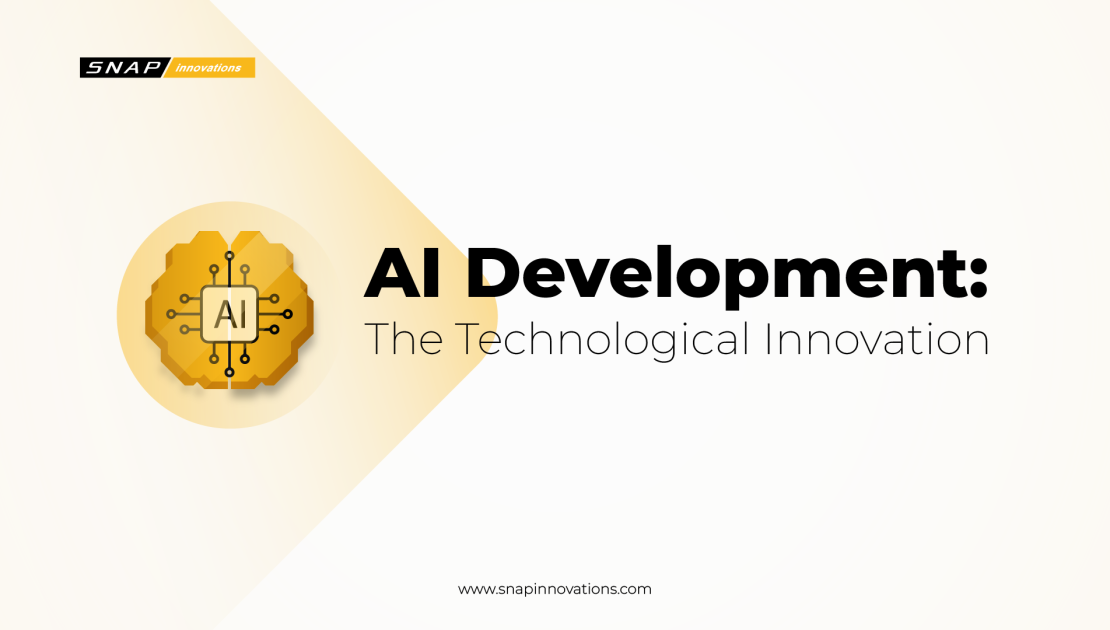In recent years, one term has been making waves in the technological realm: AI development. AI, or Artificial Intelligence, is the groundbreaking process of creating machines that can think and learn, much like humans. From digital assistants like Siri to customer service chatbots and even autonomous vehicles, AI is reshaping the landscape of our daily lives. This article dives deep into the intricacies of AI development, exploring its facets, challenges, and the future that awaits us.
AI development isn’t just a buzzword—it represents a new age in which our relationship with technology becomes even more intertwined. As our reliance on devices and digital systems grows, the demand for smarter, more adaptive technologies is also on the rise. And that’s where the magic of AI development comes in. By teaching machines to understand, reason, and learn, we’re not just advancing technology; we’re pioneering a new era of human-machine collaboration.
While the potential of AI is immense, understanding its development requires a deep dive into its various components, techniques, and implications. From the methods used to develop these systems to their applications and the ethics surrounding them, there’s a lot to uncover. Let’s delve into this fascinating world.
The Pillars of AI Development
 Understanding AI development is akin to piecing together a jigsaw puzzle. Each component, no matter how minute, plays a critical role. At its core, AI is built on data, algorithms, and machine learning techniques. Data feeds the AI, algorithms process it, and machine learning allows the system to evolve over time.
Understanding AI development is akin to piecing together a jigsaw puzzle. Each component, no matter how minute, plays a critical role. At its core, AI is built on data, algorithms, and machine learning techniques. Data feeds the AI, algorithms process it, and machine learning allows the system to evolve over time.
One of the most significant challenges in AI development is sourcing and managing quality data. Without the right kind of data, even the most sophisticated AI system remains ineffective. It’s like trying to paint a masterpiece without any paints. The richness, diversity, and volume of data dictate how well an AI system can perform.
Algorithms are the heart of the AI system. They are pre-defined sets of instructions that the AI follows. Think of them as the recipes for a dish. The right ingredients (data) combined with the perfect recipe (algorithm) can create a delightful outcome. However, tweaking and refining these algorithms is a continuous process that requires expertise and precision.
Finally, machine learning models are what make AI truly “intelligent.” Instead of being static, they adapt and grow with experience, just as humans do. Over time, these models can recognize patterns, make predictions, and even make decisions based on the data they’ve processed.
Also Read: Defi Staking Platform Development: Key Steps and Considerations
Applications of AI Development
 The world of AI development is a diverse and dynamic landscape, where the potential applications of artificial intelligence seem limitless. In this section, we’ll delve deeper into some of the most prominent and transformative applications across various domains.
The world of AI development is a diverse and dynamic landscape, where the potential applications of artificial intelligence seem limitless. In this section, we’ll delve deeper into some of the most prominent and transformative applications across various domains.
1. Virtual Assistants and Chatbots:
Virtual assistants like Siri and Alexa have become household names, and their capabilities continue to expand. These AI-driven entities rely on sophisticated natural language processing (NLP) algorithms to comprehend and respond to human commands and queries. They can do much more than set reminders and answer questions; they can control smart homes, provide weather updates, and even engage in casual conversations, creating a seamless and interactive experience for users.
AI-driven chatbots, on the other hand, are finding their way into customer service, providing instant support to customers 24/7. These chatbots can answer frequently asked questions, troubleshoot problems, and even guide users through complex processes. By automating routine inquiries, they free up human agents to focus on more complex and value-added tasks.
2. Healthcare Revolution:
In the healthcare sector, AI is proving to be a game-changer. Machine learning algorithms analyze vast datasets of medical information, ranging from patient records and imaging data to genomic sequences. This analysis enables early disease diagnosis, personalized treatment plans, and drug discovery.
Imagine a scenario where AI analyzes a patient’s medical history, genetic makeup, and current symptoms to recommend a treatment plan tailored precisely to their unique needs. Additionally, AI-driven diagnostic tools can identify subtle patterns in medical imaging, such as X-rays and MRIs, improving the accuracy of disease detection and reducing the margin for error.
3. Self-Driving Cars:
AI-powered self-driving cars are at the forefront of transportation innovation. These vehicles use a combination of sensors, cameras, and AI algorithms to navigate roads safely and efficiently. The promise of self-driving cars extends beyond convenience; it has the potential to significantly reduce accidents caused by human error, decrease traffic congestion, and even make transportation more accessible for individuals with disabilities or limited mobility.
Moreover, self-driving cars can optimize fuel efficiency and reduce emissions by making real-time decisions based on traffic conditions and the most efficient routes. The integration of AI in transportation could transform our cities and revolutionize how we move from place to place.
4. Financial Intelligence:
In the world of finance, AI development has found a home in fraud detection and portfolio management. Financial institutions rely on AI algorithms to analyze vast amounts of transaction data in real-time, flagging suspicious activities and preventing fraudulent transactions. This not only protects consumers but also safeguards the integrity of the financial system.
On the investment front, AI-driven robo-advisors provide personalized investment recommendations based on an individual’s financial goals and risk tolerance. These systems continuously monitor market conditions and make portfolio adjustments, optimizing returns and minimizing risk.
5. Entertainment Enhanced:
Entertainment has also witnessed a transformation thanks to AI development. Streaming platforms like Netflix and Amazon Prime leverage AI recommendation algorithms to curate content tailored to each user’s preferences. By analyzing your viewing history, they suggest movies and TV shows that align with your interests, keeping you engaged and entertained.
In the realm of gaming, AI-driven non-player characters (NPCs) are taking on new dimensions. These NPCs are no longer just scripted entities; they adapt and learn from player actions, making the gaming experience more immersive and challenging. Whether you’re exploring vast virtual worlds or engaging in intense battles, AI adds depth and unpredictability to the gaming experience.
Challenges in AI Development
 While AI development holds immense promise, it is not without its challenges.
While AI development holds immense promise, it is not without its challenges.
1. Data Privacy Concerns
The challenge of data privacy in AI development is multi-faceted. AI systems thrive on data, and often, this data involves personal and sensitive information. When collecting and utilizing such data, ethical and legal dilemmas arise.
Firstly, there’s the issue of informed consent. Users may not always be aware of how their data is being used to train AI models or may not fully understand the implications. This lack of transparency can lead to privacy violations and erode trust in AI systems. Striking the right balance between harnessing the power of data and respecting individual privacy is a paramount concern for both developers and policymakers.
Moreover, data breaches can have severe consequences. AI systems are susceptible to attacks, and if they contain personal information, they become attractive targets for hackers. Ensuring robust cybersecurity measures and encryption practices is an ongoing challenge in AI development to safeguard sensitive data.
2. Bias in AI Algorithms
Bias in AI algorithms is a critical challenge that can have far-reaching societal impacts. Machine learning models learn from historical data, and if that data contains biases, the AI system can perpetuate and amplify those biases, leading to unfair outcomes.
For instance, biased training data can result in AI systems that exhibit racial, gender, or socioeconomic biases. These biases can manifest in various ways, from discriminatory hiring algorithms to biased loan approval systems. Correcting this bias is a complex and ongoing process that requires careful data curation, algorithm design, and continuous monitoring.
Efforts are being made to mitigate bias through techniques like debiasing algorithms and fairness audits. Additionally, organizations are increasingly focusing on diversifying their development teams to bring in different perspectives and reduce inherent biases in AI development.
3. Scalability and Computational Resources:
Scalability and the need for substantial computational resources are practical challenges in AI development. Training advanced AI models, especially deep learning models, demands significant computing power and storage capacity. This can pose accessibility issues, particularly for smaller organizations and researchers with limited resources.
Democratizing AI development and making it accessible to a broader range of users is essential for fostering innovation and inclusivity. Cloud-based AI services and open-source AI libraries have helped lower entry barriers, but there is still a need to address issues like affordability and the digital divide.
Moreover, the environmental impact of AI’s energy consumption is a growing concern. The carbon footprint of training large AI models can be substantial, making it important for developers to consider sustainable AI practices and explore more energy-efficient training methods.
The Future of AI Development
 The future of AI development is exceptionally bright. With ongoing advancements in deep learning, AI models are becoming more capable of understanding context, reasoning, and even common sense. This means they can handle a wider range of tasks with improved accuracy.
The future of AI development is exceptionally bright. With ongoing advancements in deep learning, AI models are becoming more capable of understanding context, reasoning, and even common sense. This means they can handle a wider range of tasks with improved accuracy.
AI will continue to integrate into our daily lives, making our devices smarter and more intuitive. We can expect AI-powered healthcare to become more personalized, AI-driven education to adapt to individual learning styles, and AI-enhanced workplaces to boost productivity.
Ethical AI development will be a cornerstone of the future. Developers will prioritize transparency, fairness, and accountability in AI systems. We can anticipate the rise of AI ethics committees and regulations to ensure responsible AI deployment.
The Role of AI Development in Business
In the corporate world, AI development is a game-changer. It streamlines operations, automates repetitive tasks, and offers valuable insights from data. Companies are increasingly turning to AI for customer relationship management, predictive analytics, and supply chain optimization.
- Streamlining Operations: AI development enables businesses to automate routine and time-consuming tasks, such as data entry, document processing, and inventory management. This streamlines operations, reduces human error, and enhances overall efficiency.
- Customer Relationship Management (CRM): AI-powered CRM systems analyze customer data, providing insights into customer behavior, preferences, and trends. This helps businesses tailor their products and services, personalize marketing campaigns, and improve customer retention.
- Predictive Analytics: AI algorithms can predict future trends, market shifts, and customer demands by analyzing historical data. This enables businesses to make proactive decisions, optimize resource allocation, and seize opportunities before competitors.
- Supply Chain Optimization: AI enhances supply chain management by optimizing inventory levels, predicting demand fluctuations, and identifying potential bottlenecks or disruptions. This ensures smoother operations and cost savings.
- AI-driven Chatbots: Chatbots equipped with AI can handle customer inquiries and provide assistance 24/7. They use natural language processing to understand and respond to customer queries, improving response times and customer satisfaction.
- Data-driven Decision Making: AI empowers businesses to make data-driven decisions. Advanced analytics tools can process vast datasets to uncover patterns, correlations, and actionable insights. This informs strategic choices across various departments, from marketing to finance.
- Marketing Campaign Optimization: AI can analyze consumer behavior and preferences to create highly targeted marketing campaigns. It can personalize content, recommend products, and optimize ad placements, resulting in higher conversion rates and ROI.
- Inventory Management: AI-driven inventory management systems monitor stock levels in real-time and automatically reorder products when necessary. This prevents overstocking or understocking, reducing carrying costs and ensuring products are always available.
- Competitive Necessity: In today’s competitive landscape, embracing AI is no longer an option but a necessity. Companies that harness AI technologies gain a competitive edge by increasing efficiency, improving customer experiences, and staying agile in a rapidly changing market.
- Ethical Considerations: While AI offers immense benefits, organizations must also consider the ethical implications. Transparency in AI decision-making processes is essential to build trust with customers and stakeholders. Additionally, businesses must ensure that AI systems do not perpetuate biases and actively work to identify and mitigate any biases that may arise.
- Stakeholder Transparency: Businesses need to communicate clearly with stakeholders about their use of AI. This includes explaining how AI systems are employed, what data is collected, and how it is used. Transparency builds trust and helps mitigate concerns related to privacy and data security.
AI Development and Society
The impact of AI development on society is profound. While AI can create efficiencies and solve complex problems, it also raises concerns about job displacement. As AI automates certain tasks, the workforce must adapt by acquiring new skills that complement AI technologies.
Read Next: Due Diligence: Where to Start with Digital Asset Projects?
Education will play a pivotal role in preparing individuals for an AI-driven world. Lifelong learning and upskilling will become essential to remain relevant in the job market. Governments and organizations will need to invest in training and education programs to ensure a smooth transition.
Additionally, AI development has the potential to address critical societal challenges. It can improve disaster response, optimize resource allocation, and contribute to climate change mitigation through data analysis and prediction.
The Ethical Imperative of AI Development
As AI development accelerates, ethical considerations become paramount. Ensuring that AI is developed and deployed responsibly is a shared responsibility. Developers, businesses, and policymakers must collaborate to establish guidelines and regulations that promote fairness, transparency, and accountability.
Transparency in AI algorithms is crucial to building trust. Users should understand how AI systems make decisions, and they should have control over their data. Moreover, AI should not perpetuate biases, and developers must actively work to identify and mitigate bias in their systems.
Conclusion
AI development is a journey that promises both incredible opportunities and significant challenges. It is reshaping industries, transforming our lives, and posing ethical questions that demand thoughtful solutions. As we navigate the evolving landscape of AI, it is crucial to prioritize ethical considerations, foster innovation, and ensure that AI benefits all of humanity.
This article has provided a comprehensive overview of AI development, from its evolution and applications to the challenges it faces and its bright future. By staying informed and engaged in the conversation surrounding AI, we can collectively shape a world where artificial intelligence enhances our lives and empowers us to tackle complex problems.

